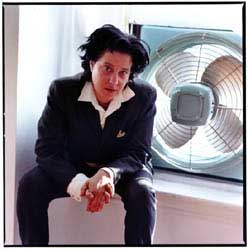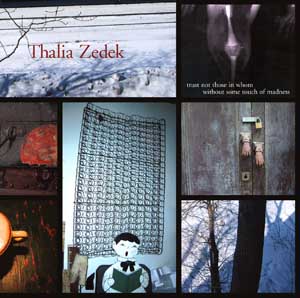-
- Personally and professionally, gay governor has uphill fight
- In Utah, same-sex marriage amendment hits unexpected bump
- Legal battle continues over Louisiana same-sex marriage ban amendment
- Judge denies relief to out-of-state same-sex couples
- People of faith ask: How would Jesus vote?
- Openly gay man appointed judge in busy Detroit court
- National News Briefs
- World News Briefs
Arts & Entertainment
In Thalia we trust: an interview with Thalia Zedek
Published Thursday, 26-Aug-2004 in issue 870
Thalia Zedek, the out lesbian singer/songwriter and a force behind such groundbreaking musical units as Dangerous Birds, Live Skull and Come, has returned with her latest solo effort, Trust Not Those In Whom Without Some Touch of Madness (Thrill Jockey). Still sounding like she could be Marianne Faithfull and Patti Smith’s kid sister, Zedek tempers her trademark growl with strings (viola and cello), piano and even a lap steel guitar, sounding like a roadhouse cabaret diva. The Gay & Lesbian Times recently spoke with Zedek about her songs and her new album, due out next month.
Gay & Lesbian Times: In preparing for this interview, I dug out my 1981 Propeller Project cassette, which has the song “Catholic Boy” by your former band Dangerous Birds on it.
Thalia Zedek: Oh, my God!
GLT: When you look back on that period in the Boston music scene, do you remember it fondly or not?
TZ: I remember it fondly, definitely. It was, I thought, a really great period in music because we were just starting to get a lot of British bands coming through [town] and there were a bunch of tiny clubs in Boston. I remember seeing bands like Bauhaus in clubs that held a hundred people. There was a ton of stuff happening, a lot of really new stuff happening in music. That was a great period. Because of the proximity to New York, a lot of these bands were coming over from England to play one show in New York and they would somehow come up to Boston. There was a guy named Jim who was a really good promoter, and there was a tiny little club called The Underground, which I think is now a Laundromat, and he used to get all these bands, that later became totally legendary, to play there. It was in Allston, right around the corner from BU (Boston University), where Commonwealth Avenue curves. I saw so many insane shows in that place.
GLT: You are known for being a member of a number of influential bands, including Live Skull and Come. What would you say are the biggest differences between your work in bands and your solo work?
TZ: With Live Skull, I pretty much just sang, and played guitar on a couple of songs. It was the only band that I was ever in where I didn’t play one of the instruments. That was really interesting, because I just wrote the vocal parts and the lyrics. I didn’t write music at all. That was a really different way to work. I’ve always written music more than lyrics; that was easier for me. That body of work with Live Skull was a really different thing; listening to people play and coming up with lyrics and melodies. With Come, there was a lot more collaboration. I guess the main difference is that I write all the songs now by myself. I still play with other musicians, but it’s not quite as collaborative in that sense.
GLT: Boston has a long history of having a gay rock scene – from Human Sexual Response and Rick Berlin (of Berlin Airlift) from the ’80s through the current array of performers such as Melissa Ferrick, Catie Curtis and others. Where do you see yourself fitting into that realm?
TZ: That’s a good question. I don’t think I fit into the Melissa Ferrick/Catie Curtis gay scene. But I definitely feel like there is a bunch of gay rockers and I fit more into that scene. When that whole Homo-core thing came out, I thought that was great. I used to write letters back and forth with Donna Dresch [of Team Dresch]. She’s still around and doing a bunch of stuff. I don’t know if I would classify myself in any kind of musical movement. I’ve always done my own music. There isn’t that kind of gay, live music scene in Boston anymore.
GLT: After a lengthy association with Matador Records, as both a member of Come and a solo artist, your new album is being released on Thrill Jockey, home of Tortoise, The Sea and Cake and others. Will you please say something about that transition?
TZ: So far, it’s been really great working with those guys, working with Bettina [Richards]. They’ve been really supportive. I’ve actually known Bettina for years and years. She lived in Boston briefly in the early ’90s, right when Come started, and then she moved to New York. We kind of kept in touch. I was looking for a new label. Matador did another big merger with Beggars Banquet and they cut back on the number of releases. I wanted to make another record and I knew they weren’t taking on any more projects. Even though I’d been in touch with Bettina – I’d seen her around when we played Chicago – I hadn’t talked to her for a while. Chris Brokaw, from Come, had been in Chicago playing some shows and I was telling him that I wanted to make a record, but I didn’t know who would be interested in putting it out. Bettina had been following my solo stuff, and unbeknownst to me had been really into it. He said that I should call her because the last time he saw her she was asking about me. My first solo record (“Been Here and Gone”) was with Matador and the second one (“You’re a Big Girl Now”) was a local Boston label called Kimchee. They originally proposed that I do a covers record, but I decided that I didn’t want to do just that. I had some original songs that I wanted to put on it, so it turned into a bigger deal than it was. I think that was the record that she liked more than the Matador one. It feels really natural [to record for Thrill Jockey] because she’s someone that I’ve known for quite a while. I think it’s a good match.
GLT: In listening to the songs “Ship” and “Bus Stop”, on the new CD Trust Not Those In Whom Without Some Touch of Madness, I perceived the use of train and bus metaphors as means for transport away from a lover. Am I on the right track?
TZ: With the train thing in “Ship” I was [thinking of] being the one left behind. Or just waiting, not sure how long it’s going to take. “Bus Stop” was actually written about a bar around the corner from my house called The Bus Stop. It’s a really crappy neighborhood bar. It’s the only one around the corner from my house, so at various times I’ve actually spent some time there, especially during the summer when it gets incredibly hot because they’ve got their air conditioning on really cold. Through the course of the years there has been a lot of confusion with various people [saying], “I’m at The Bus Stop,” and not knowing what people meant. Going to meet someone at the bus stop and they’re like, “No, I’m at the Bus Stop.” It’s more about uncertainty in relationships.
GLT: There’s a line in the song “Angels” that also jumped out at me. The line goes, “I used to change faster, now I’m always running late.” Is that a comment on getting older?
TZ: I guess so. I was thinking that when I was in my early 20s that I used to love it when my life would completely change. I was in a million bands and they would last X amount of time and then they would break up and I’d be more excited about what I was going to do next than sad. I was thinking about how I’ve changed since then and how I have a tendency to be scared to let go of anything, even though it may be not working. I didn’t love it when bad things happened. [But it was like] “All right, I don’t have a band anymore, my relationship’s broken up and I have to move to a new apartment. But this is going to be great.” That used to be my M.O., but I really changed from that at some point – I don’t know if it was with age or what exactly – to really hating it when things changed.
GLT: What do you think the gentler, more melodic and varied aspects of your solo work says about the Thalia Zedek of the 21st Century?
TZ: [Laughing] I think in a lot of ways, I am really the same. But I think that maybe the biggest difference to me, when I look at my songs, at the earlier stuff, a lot of it was based on anger. The music and the lyrics and the way they were sung. It didn’t matter what the emotion was. Now, instead of putting everything under a tent of anger, it more explores different emotions. I don’t feel so angry at everything anymore. I still get angry, but I’m able to get past that and get down and do some more interesting emotional stuff. I’ve become more interested in making more beautiful music now. Although, I don’t know if my idea of what is beautiful would go along with someone else’s. I think feedback can be really beautiful, too.
|
|
Copyright © 2003-2025 Uptown Publications



